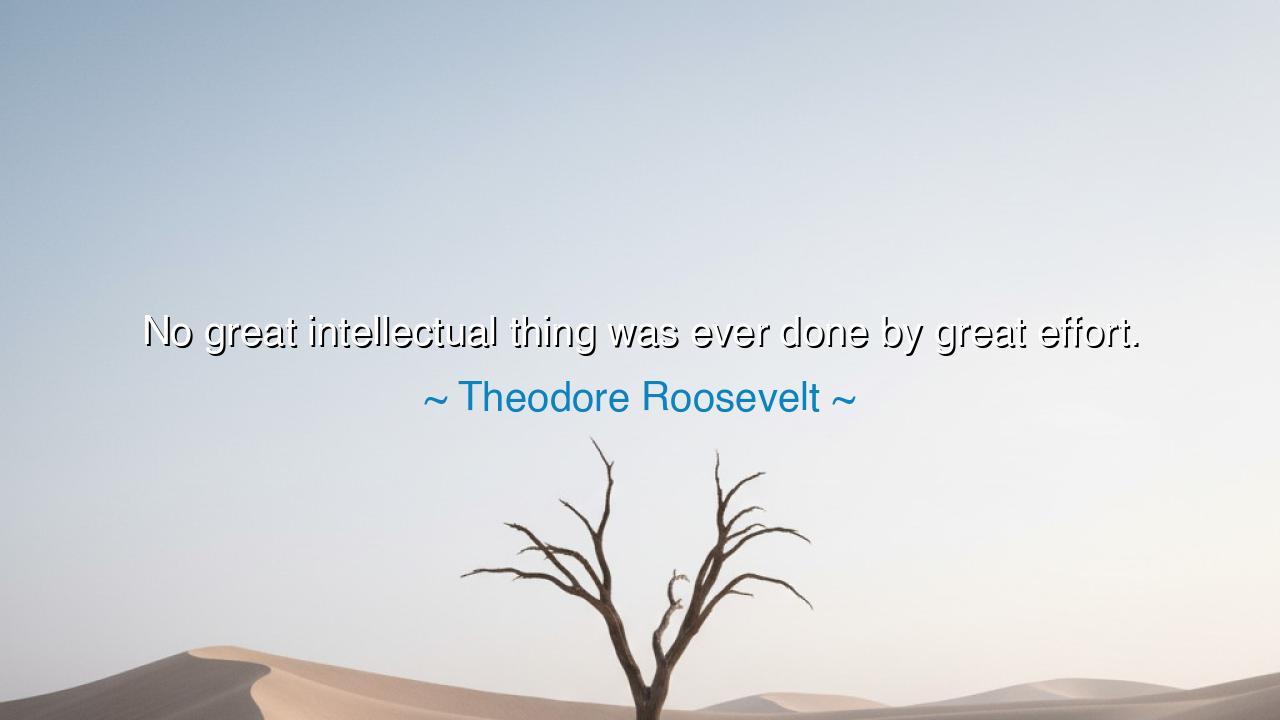
No great intellectual thing was ever done by great effort.






“No great intellectual thing was ever done by great effort.” — Theodore Roosevelt
In these curious and paradoxical words, Theodore Roosevelt, the warrior-philosopher and restless spirit of America’s age of action, gives voice to a profound truth about genius and inspiration. At first hearing, his statement seems to stand against his very nature—for Roosevelt, the man of endurance and labor, who preached the gospel of the strenuous life, now claims that the highest achievements of the mind are not born from toil. Yet, if one listens deeper, one finds the heart of his wisdom: true intellect flows not from strain, but from harmony; not from force, but from freedom. The mind, like a bird, soars best when it moves effortlessly through its own element, not when it beats its wings against a cage of anxiety.
The origin of this quote lies in Roosevelt’s reflections on the nature of creativity and thought. Though known for his vigor and discipline, he was also a man of deep contemplation—a historian, a philosopher, a reader of the ancients. He understood that the greatest thinkers—Plato, Shakespeare, Darwin, Emerson—did not reach brilliance by grinding effort, but by living in the rhythm of their work, allowing inspiration to become as natural as breathing. To “do a great intellectual thing,” he observed, one must be so absorbed, so aligned with one’s purpose, that effort vanishes and joy takes its place. The act becomes an extension of one’s being.
Roosevelt’s insight is echoed in the wisdom of the ancients. The philosopher Aristotle spoke of eudaimonia, the divine flourishing of the soul in its proper activity. When a man does the work he was born to do, his effort ceases to feel like labor; it becomes natural motion, like the flame that rises or the river that flows. Likewise, Lao Tzu taught that the sage acts without struggle, accomplishing great things through effortless harmony with the Tao. Roosevelt, though a man of action, understood this inner law: that the greatest intellectual triumphs—the theories that change science, the art that moves the heart—are born not from tension, but from tranquility joined with passion.
Consider the life of Isaac Newton, who discovered the law of gravitation not in a fever of exertion, but in a moment of serene observation beneath an apple tree. His genius did not come from frantic striving, but from stillness filled with wonder. Or think of Mozart, who wrote symphonies as though they poured directly from the heavens, saying he “saw the whole piece in his mind at once.” Their greatness came not because they forced thought, but because they became its vessel. When the mind is free of strain, ideas flow as naturally as stars emerging in the twilight sky.
Yet Roosevelt’s saying does not dismiss effort altogether. Rather, it teaches the balance between labor and ease—between discipline and inspiration. There is no greatness without preparation; yet there is no creation without freedom. The sculptor must master the chisel before he can shape beauty, but when he does, his hand moves as if guided by grace. The writer must learn his craft, yet the masterpiece comes only when words begin to speak through him, not from him. Thus, effort is the road, but effortlessness is the destination. The mountain is climbed by steady steps, but the summit is reached when the climber forgets fatigue and feels only the wind and the sky.
Roosevelt’s quote, then, is a hymn to flow—to the sacred state where mind and purpose become one. He reminds us that intellectual greatness is not wrestled into existence; it is revealed, like a statue emerging from marble once the unnecessary stone is removed. The truly great thinker is not one who strains to create, but one who listens deeply to the voice of truth within, and allows it to speak. For the mind, when calm and confident, becomes the channel of ideas larger than itself.
The lesson, O seeker of wisdom, is this: do not force brilliance—prepare for it. Train your mind, discipline your craft, but then let go of strain. Create space for stillness, for curiosity, for wonder. Walk beneath the open sky, read with love, labor with joy—and when the moment comes, your thoughts will flow like rivers to the sea. Remember that effort may build the foundation, but inspiration raises the temple. The mind that works too hard grows weary; the mind that flows with purpose grows radiant.
So, let these words of Roosevelt be your guide: great effort makes a worker; great ease makes a creator. Seek not to conquer thought by force, but to invite it by reverence. For when the mind moves in harmony with its divine calling, every idea becomes effortless—and in that ease lies the highest power of all.






AAdministratorAdministrator
Welcome, honored guests. Please leave a comment, we will respond soon